The Complete Aeschylus, Volume I: The Oresteia Read online
Page 3
Look down
on the unfledged orphans of a father eagle—
killed in the viper’s coils, her tangling lust;
see the unfathered nestlings starve, too young,
too weak to hunt, to bring the prey back to the nest
the way their father did. (279–84 / 247–51)
Instead of parent birds crying for their lost young, Zeus is to heed the cry of chicks who have lost their parent, the father eagle who should nourish and protect his young. Orestes’ situation both resembles and reverses that of his father.8
Agamemnon in death has become a sacred hero, to be propitiated and called on for help; his tomb is now a hero’s shrine. For the Chorus of slave women loyal to Agamemnon, it is “like an altar” (129 / 106), and Electra calls it a refuge for suppliants and exiles (382–84 / 336–37). Even Clytemnestra has sent libations to the tomb in hopes of placating the powerful spirit that dwells there. Here Electra and Orestes are reunited in an emotional upwelling of love for their father and desire to avenge his death. Orestes has been commanded directly and unequivocally by Apollo to kill Agamemnon’s killers, and he has come to accept his mother’s slaying as an unavoidable act of justice, to be accomplished even at the cost of his own death (499–503 / 435–38, cf. 339–51 / 297–306). Yet, in contrast to Clytemnestra’s vaunted delight in the slaughter of her hated lord, when the moment comes, Orestes hesitates until his companion Pylades, silent until now, reminds him of Apollo’s oracle and his obligation to the gods (1028–30 / 900–902). Despite this hesitation, however, it would be inaccurate to say that Orestes is torn between the need for vengeance and revulsion at killing his own mother. His situation is complicated, because Libation Bearers offers the same combination of divine and human responsibility, compulsion and freedom, that we found in Agamemnon. Like Agamemnon at Aulis, Orestes has received a divine command; like Agamemnon, he is free to disobey. If anything, the tragedy of being damned if you do and damned if you don’t is more explicit for Orestes than for his father, since in Agamemnon the consequences of refusing to sacrifice Iphigenia (thus failing to avenge the abduction of Helen and ending the Trojan War before it began) are left entirely to the imagination. In Libation Bearers, by contrast, Apollo spells out at great lengths what punishments await Orestes if he fails to act. At the same time, there is no doubt that Orestes has accepted the burden of avenging his father’s murder in the full knowledge of what it entails.
Orestes cannot be called a puppet of the Olympian gods or the powers of the underworld, as some critics have tried to do; nor is he “an unwilling avenger... terrorized by the god [Apollo] into accepting his part.”9 And yet, although his choice of matricide is demanded by justice, by Apollo, and by the spirit of his father, it also makes him guilty of a crime that calls out for punishment in turn. Early in the play, the Chorus assures Electra that she may, indeed she must, pray for an avenger of her father’s death:
CHORUS LEADER A prayer for some god or man to come against them—
ELECTRA Someone to judge them or do justice to them?
CHORUS LEADER Say it straight: someone who’ll take a life for a life.
ELECTRA Can it be right for me to ask this of the gods?
CHORUS LEADER Can it be wrong to pay back hurt with hurt? (142–46 / 119–23)
Electra’s question, “Someone to judge them [dikastên, the regular Greek word for juror] or to do justice to them?” [dikêphoron, “bringing justice,” Aegisthus’ word to describe the day of Agamemnon’s death, Agamemnon, 1814 / 1577], ironically suggests a legal solution in a world that has as yet no legal recourse, at least in regard to homicide. So she duly includes a “prayer for evil” in her prayer for good (173 / 146), and the work of justice is duly marked as part also of an unending cycle of wrongs. Orestes’ final words to Clytemnestra before he takes her inside to kill her are a kind of summation: “You did wrong, killing; now suffer wrong and die!” (1059 / 930).
So, despite all the differences of tone and circumstance, the nature of justice in Libation Bearers is no different from that in Agamemnon. The play reveals this in any number of ways. The most striking thing in the long list of sufferings that await Orestes if he refuses to kill his mother is the promise of pursuit by his father’s Erinyes (320–23 / 283–84). At the end of Libation Bearers, it is his mother’s who begin their assault. The choice of evils he must make could not be clearer or more vivid. When Orestes has finished his account of Apollo’s command, the Chorus repeats the great lesson of Agamemnon: “Who does shall suffer” (360 / 313;cf. Agamemnon, 1798 / 1564). Aeschylus underlines the continuity of meaning between the actions of the two plays by staging Orestes’ display of the bodies of his victims as a “mirror scene” to one in Agamemnon.10 There, Clytemnestra comes into view standing over the corpse of Agamemnon, apparently still wrapped in the robe in which she murdered him, with Cassandra lying at his side. Here, Orestes appears amid the bodies of Clytemnestra and Aegisthus and displays the same bloodied robe as a token of the justice of his deed (1105–51 / 980–1017).
The essential identity of the revenge action in Libation Bearers with that in Agamemnon is further emphasized in what now follows. While Orestes is slaying his mother, the Chorus, like Aegisthus at the end of Agamemnon, imagines that light—the light of dikê—has returned to the house that was shrouded in darkness:
See how the light has come, and the hard curb
that held the house is broken!
Arise, O house, arise, too long you’ve lain
in shambles on the ground. (1087–90 / 961–64)
Like Clytemnestra, they imagine an end to the reign of the Erinys that has beset it:
But soon will Time, the all-accomplishing, pass in
through the front gate of the house
when all pollution is expelled
from the hearth by the cleansing rites which drive
out acts of bloodshed. (1091–94 / 965–68)
When Orestes appears with the bodies of his victims, he avoids the intemperate excess of Clytemnestra’s vaunts, but like her he is soon driven to self-justification. And just as Clytemnestra’s offer to give up her wealth to placate the Spirit of the house represented her recognition that the story was not yet over, so Orestes’ announcement that he must set off for Delphi to seek purification (1172–77 / 1034–39) announces further travails to come. Even more strikingly, he begins to feel the madness that is a sign that his mother’s Erinyes have already begun their pursuit. Orestes’ final self-justification is also a tortured admission that darkness has begun to fall:
I’m like a charioteer
driving his team far off the course, my mind’s
unreinable, it bucks and pitches me away,
and I’m defeated, and fear near my heart is ready
to sing and dance now to a raging tune.
Before I lose hold of my senses, though,
I openly declare to all my friends,
not without justice did I kill my mother,
stained as she was with murdering my father,
and with the hatred of the gods. (1157–66 / 1022–27)
At the end of Libation Bearers, Orestes alone sees “the bloodhounds of my mother’s anger” (1193 / 1054) and, despite the Chorus’ attempts to calm him, bolts in terror. The Chorus members are left to reflect that the justice they prayed for and welcomed has resolved nothing. The play closes with the same question that shadowed the end of Agamemnon:
Where will it end? When will it all
be lulled back into sleep, and cease,
the bloody hatred, the destruction? (1215–17 / 1075–76)
Justice, visited on mortals as a series of retributions for past crimes that call out for yet more revenge, cannot come to rest at a point of balance. Just as Agamemnon forced us to realize that the most dreadful crimes can be acts of dikê, so Libation Bearers insists that we see acts of just retribution as further crimes that make their own demand for vengeance. The question of how to achieve a lasting ba
lance, one that preserves rather than destroys the social order still lacks an answer.
THE UNNATURAL HISTORY OF JUSTICE AND THE BIRTH OF THE POLIS
The stage has been set for a new turn in the story of death and revenge in the house of Atreus. Eumenides moves from Argos to Delphi and Athens, and, as we shall see, from the old world of vendetta to the new world of the polis and its laws. Aeschylus makes it clear that the old world can offer no solution to the dilemma of dikê, which in its retributive form is incompatible with stable and prosperous human communities. The ghost of Clytemnestra, who stirs the sleeping Erinyes to continue their terrifying pursuit of her murderer-son, belongs entirely to the old world of retribution. Her Erinyes, for their part, see themselves as the great upholders of justice against the onslaught of younger gods who would trample it down. While they can adopt the language of moderation and restraint (e.g., 619–30 / 526–37), they are firm believers in the efficacy of fear and wailing (613–18 / 520–25), and utterly unyielding in the pursuit of just revenge. The punishment they promise Orestes has the balance of an accountant’s ledger:
You’ll have to pay with your own blood for hers,
you’ll feel me suck the half-
caked gore out of your living flesh;
swill from your very veins
the vile dregs of the drink I crave.
I’ll shrivel you up and drag you, still alive
into the underworld
where you will pay in currencies of torment
for the murder of your mother. (1300–1309 / 264–68)
For the Erinyes, Apollo’s very sanctuary is polluted by the welcome Apollo has given to the blood-stained Orestes (181–92 / 164–73). Orestes, on the other hand, repeatedly emphasizes the purifications he has received there (265–69 / 236–39, 319–27 / 276–83, 528–38 / 445–53). Apollo confirms that he has purged his suppliant of the stain of guilt (671–74 / 576–78), and Athena accepts him as “a proper suppliant who is clean, who bears / no danger to us” (563–64 / 474). Despite all that, the Erinyes still track him by the scent of blood, and it is clear that the old rites designed to return a murderer to a place in the social order, are not sufficiently powerful to overcome their assault. Wander where he may, flee however long he can, Orestes will never escape them. The point is that there is no simple ritual “fix,” and no hope either for the mere passage of time to heal all wounds. As Aeschylus tells the story, the only way to force an end to the chain of crime and vengeance is to change the modality of dikê itself.11
The solution worked out in Eumenides brings myth from an imagined bronze-age past into the world of contemporary Athenian experience. Aeschylus provides a new foundation myth—one that cannot be traced to any previous source and is almost certainly of the poet’s own devising—for two venerable Athenian institutions: the homicide court known as the Areopagus from its meeting place on the Hill of Ares near the acropolis, and the nearby cult of the Semnai Theai— the August Goddesses, a euphemistic name for the Erinyes.12 The Areopagus was a council of elders that played an important role in Athenian political life over many generations, but had recently (462, only four years before the performance of the Oresteia) been reformed to serve exclusively as a court for hearing cases of homicide. Athenian legend explained that the Areopagus had been founded to handle a trial for murder, but in that case the defendant was the war god Ares (whence the court’s name), prosecuted before a divine jury by Poseidon for the murder of his son Halirrhothius, who in turn had raped Ares’ daughter Alcippe.13 Aeschylus’ substitution of Orestes’ trial for the trial of Ares, and human jurors for the divine jury, transforms the foundation story of the first homicide court into an aetiological myth about the replacement of retributive clan violence with the judicial deliberation of the polis. The second foundation story, explaining how Athens came to worship the Erinyes at a shrine near the Areopagus, is really a corollary of the first. Apparently, there was already a close connection between the cult of the Semnai Theai— the August Goddesses, one of the euphemistic names under which the Erinyes were honored—and the Areopagus.14 Having chosen to make the Erinyes Orestes’ persecutors, Aeschylus found it natural to connect his story to their nearby shrine by making his trial the occasion for the cult’s foundation.
In any case, Aeschylus’ linking of court and cult is anything but fortuitous. Legal justice supersedes private retribution, but the terror that these stern ancient deities inspire is still needed to deter people from committing crimes and to ensure their respect for law. As the jurors prepare to judge the first trial for murder, Athena offers this advice:
I urge my people to follow and revere
neither tyranny nor anarchy,
and to hold fear close, never to cast it out
entirely from the city. For what man
who feels no fear is able to be just? (813–17 / 696–99)
This is almost precisely what the Erinyes themselves sang as they awaited the beginning of the trial:
What man, or city even,
whose heart is not fed on fear,
would ever again pay Justice
the reverence she’s owed?
Praise no life that no law reins,
no life a tyrant rules. (615–20 / 522–28)
The Erinyes’ old law is not obliterated by the new, nor in accepting their new home and honors do they become something entirely different from what they were. The metamorphosis of Erinyes to Eumenides in this play is but the most obvious and important of a whole series of transformations to bring dikê firmly into the world of the polis. Nevertheless, just as the fundamental nature of dikê remains the same, but now can reveal itself in another form or aspect, so the transformations are best understood as revelations of new aspects, not complete negations of old identities. In the case of the Erinyes, it is well to remember that blessing is the other side of the coin from cursing. They have a new role, but the powers they embody remain what they always were. Something similar may be said about Zeus, who presides over justice as a kind of master signifier throughout the trilogy. He may or may not evolve during its course (a heated debate on this subject raged in earlier Aeschylean scholarship), but it is fair to say that his dominant aspect shifts in the course of the trilogy from a stern and angry enforcer—for example, Zeus xenios (“lord of host and guest,” Agamemnon, 417 / 362), who exacts punishment for the transgressions of Paris by sending the Achaeans to raze the city of Troy—to the Zeus who works his will by means of words—Zeus agoraios (“Zeus who guides / men’s speech,” Eumenides, 1135–36 / 973). The epithet agoraios makes Zeus patron of the agora, the place of public meetings, and implies that he presides over civic deliberation. For all the differences in these aspects of the deity, he does the work of dikê equally in both guises.
Such transformations as these involve the relations of men and women, and even of the gods and mortals, aspects of the trilogy to which we shall soon return, and which have to do with a new understanding of human communities as political entities, and how they might survive and flourish. At this level, Aeschylus ties the change in dikê to a change in political structure.15 The world of Agamemnon is that of a traditional Homeric aristocracy, with hereditary power belonging to the males of great houses—power here mired in equally hereditary crime and challenged by a wily woman and her subservient male partner. Usurpation by the upstarts Clytemnestra and Aegisthus involves a form of persuasion that we can characterize as temptation or seduction, typified by the honeyed words with which Clytemnestra leads her husband along the crimson path to his death. The usurpers’ victory overturns the old hereditary pattern and transforms Argos, as we see it in Libation Bearers, into a tyranny, repressive because imposed against the will of the community. To contest this repression, the male heir returns and is joined by his sister, though she plays a distinctly subordinate role. The form of persuasion authorized by Apollo’s oracle and used to thrilling effect in Libation Bearers is intrigue and deceit, embodied chiefly in Orestes’ false report of his ow
n death, which gains him entrance into the palace and (through a bit of strategic trickery by the Chorus) brings Aegisthus home unguarded and unarmed. Eumenides frees Orestes after long wanderings to return to Argos and reclaim his birthright, but the chief focus is now entirely on the transformation wrought in Athens by his trial. In this way, the emergence of the institutions of the democratic polis can be symbolized (or more precisely represented in a kind of metonymy) by the establishment of a court of law. Significantly, the language that effects the transformations of Eumenides is no longer that of temptation or intrigue, but persuasive speech, the matrix of legal and political debate in a democratic state.
The complex relation of gender and power in the Oresteia has been much discussed in recent years.16 It is often said that from this point of view the story of the Oresteia is one of women’s political disenfranchisement, and it is certainly possible to see the political thrust of Eumenides as validating a change from the perverted female rule of Clytemnestra to the (real) patriarchy of Athens in Aeschylus’ own day, in which women were as far as possible excluded from participating in public life. It must be understood, however, that what is at stake here is not a record of the loss of women’s power, but a myth of failed rebellion against a patriarchy that had always been in place. In weighing such views, much will depend on how one frames the issues. Take, for example, the version of the Delphic succession myth presumably invented by Aeschylus as a replacement for the usual story, in which Apollo won control of the most important sanctuary in Greece by the bloody conquest of Pytho, a vicious female monster.17 According to the very different account in Eumenides, Delphi passed peacefully from Mother Earth to her daughter Themis, and then by Themis’ own free will to Phoebe, another child of Earth, and from her to Apollo, who thenceforward added “Phoebus” to his name (1–10 / 1–8). Froma Zeitlin argues that this way of telling the story provides “a direct mythological model for the transference of power from female to male,” differing from the traditional story only because Aeschylus wants a peaceful and orderly version of the transfer to foreshadow the orderly, peaceful ending of the trilogy.18 Peter Rose, on the other hand, points out that the main thrust of the change is to repudiate a particularly misogynist tradition of violent male triumph over the very embodiment of female viciousness. From this perspective, the prominence in Aeschylus’ version of a whole succession of female figures evoked in very positive terms, the device of Phoebe’s friendly transfer of Delphi to Apollo as a birthday present, and Apollo’s adoption of her name as a gesture of recognition are distinctions with a difference, even if the outcome (a given) remains the same. Rose concludes:

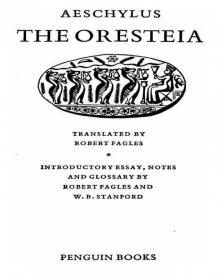 The Oresteia: Agamemnon, the Libation Bearers, the Eumenides
The Oresteia: Agamemnon, the Libation Bearers, the Eumenides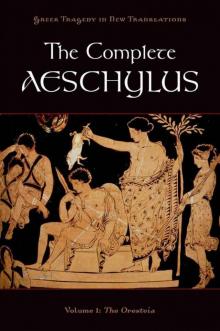 The Complete Aeschylus, Volume I: The Oresteia
The Complete Aeschylus, Volume I: The Oresteia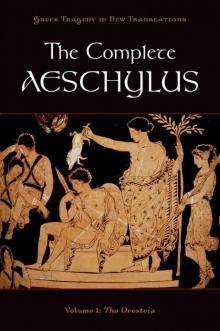 The Complete Aeschylus - Volume I: The Oresteia
The Complete Aeschylus - Volume I: The Oresteia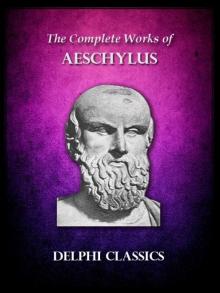 Delphi Complete Works of Aeschylus (Illustrated) (Delphi Ancient Classics)
Delphi Complete Works of Aeschylus (Illustrated) (Delphi Ancient Classics)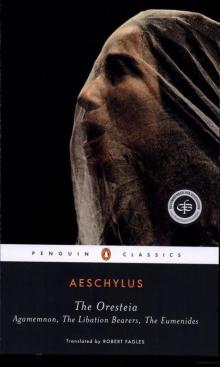 The Oresteia: Agamemnon, the Libation-Bearers & the Furies
The Oresteia: Agamemnon, the Libation-Bearers & the Furies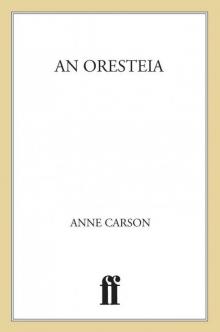 An Oresteia: Agamemnon by Aiskhylos; Elektra by Sophokles; Orestes by Euripides
An Oresteia: Agamemnon by Aiskhylos; Elektra by Sophokles; Orestes by Euripides